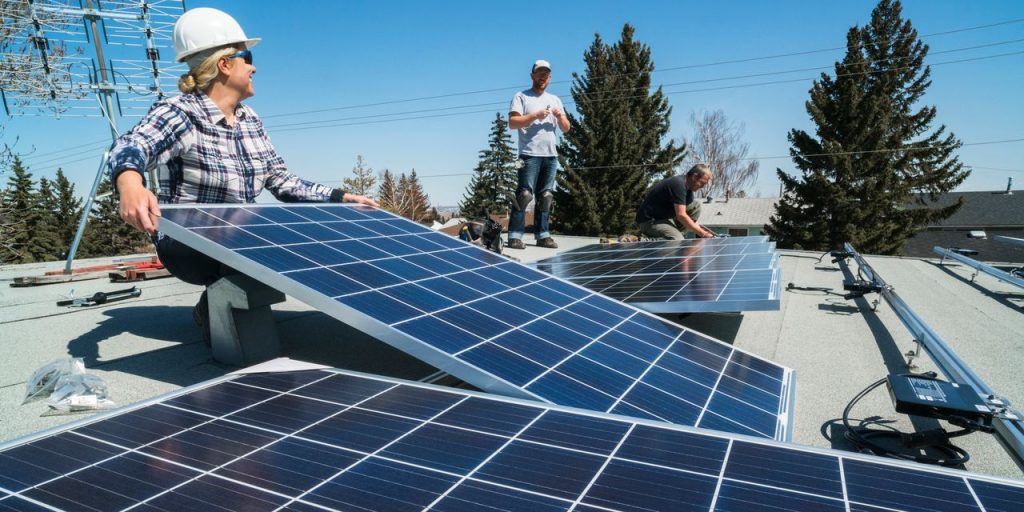The Senate joined the House in voting to reinstate tariffs on solar-panel imports from several Southeast Asian countries that China has used as a workaround to boost its own sales, critics say.
It’s an attempt by mostly Republicans, and some Democrats, to reverse a pause on such tariffs imposed by President Joe Biden as part of his wider effort to buy time for American-made solar growth. Biden has said he’ll veto this action.
Republicans control the House and have strong sway in the closely divided Senate, where California Democratic Sen. Dianne Feinstein remains out for health reasons and conservatives such as Sen. Joe Manchin, D-W.Va., often side with the GOP, especially on energy issues.
With Biden’s action last year, following a Commerce Department investigation into unfair trade, the president said the tariffs had led to delays or cancellations of hundreds of solar projects meant to boost the energy sources at businesses and homes across the U.S. Solar power
TAN,
is a key part of Biden’s goal for the U.S. to achieve 100% clean electricity by 2035, a target date that most energy groups call ambitious.
Lawmakers against the tariff reversal are using two tacks. The reversal would force companies to pay $1 billion in retroactive duties by using a legislative vehicle called the Congressional Review Act. At the same time, as part of a debt ceiling debate, the Republican-controlled House wants to repeal clean-energy provisions in the Inflation Reduction Act (IRA).
U.S. solar installers generally back panel imports from overseas to keep up with demand, while some U.S. solar-product manufacturers contend that China has essentially moved operations to four Southeast Asian countries — Thailand, Vietnam, Malaysia and Cambodia — to skirt stricter anti-dumping rules that limit imports from China.
Biden had halted the tariffs for two years before the Commerce investigation was completed, saying he was responding to an emergency that threatened the availability of electric power.
Trade group the Solar Energy Industries Association says the U.S. with current manufacturing capacity cannot domestically produce enough panels and cells to meet demand.
Abigail Ross Hopper, president and CEO of SEIA, has expressed concern that some lawmakers want to target the solar provisions of the IRA, the broad-based spending bill passed in August 2022 that incentivizes a business and household shift to solar and wind, electric vehicles and more.
New investments announced since the passage of the IRA would bring America’s solar-module manufacturing capacity to more than 47 gigawatts, five times more than the U.S. could have produced on its own in 2022, the SEIA says. Repealing the IRA will stop this investment in its tracks, the group says.
“The two-year solar tariff moratorium was imposed as a strategic bridge to stand up U.S.-based manufacturing capacity while allowing developers to keep building projects and move us toward our clean energy goals,” Ross Hopper said in a release.
“Companies are making massive investments in manufacturing facilities across the country thanks to the IRA, and all this legislation serves to do is undercut American businesses as they invest billions in capital and seek to employ thousands of workers,” she said, adding her group’s push for the Senate to vote down the reversal.
Rep. Jason Smith, a Republican of Missouri, said last week that restoring the tariffs would hold China accountable while protecting U.S. jobs and workers. Tariffs would protect American manufacturers who are facing unfair competition from China, which is subsidizing its products and selling them at low prices, Smith said.
“These trade abuses are well-known to all of us in this chamber,” said Smith, chairman of the tax-writing House Ways and Means Committee. “By shipping its products through Cambodia, Malaysia, Taiwan and Vietnam, [Chinese officials] have set up a scheme that cheats American workers and consumers.”
But others, namely in the solar-installation business, say the tariff reversal will cost jobs.
“Biden’s pause on new solar tariffs provided a much-needed bridge for companies to deploy clean energy and keep American workers on the payroll as the U.S. builds out a dramatic ramp-up in our domestic solar manufacturing sector,” said George Hershman, CEO of San Diego-based SOLV Energy, among the nation’s largest utility-scale solar providers.
The Associated Press contributed.
Read the full article here




